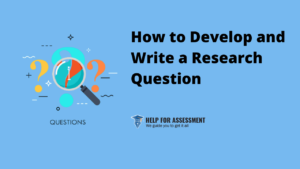Developing A Research Question
 However, more extensive research tasks such as dissertations require multiple research questions focused on and linked to the main research problem. The answer you will develop to the research question will be your thesis statement. A thesis statement presents the central position your article will argue for. Various research types are associated with distinct kinds of research questions. The following are features of a good research question:
However, more extensive research tasks such as dissertations require multiple research questions focused on and linked to the main research problem. The answer you will develop to the research question will be your thesis statement. A thesis statement presents the central position your article will argue for. Various research types are associated with distinct kinds of research questions. The following are features of a good research question:
- It should focus on a specific issue.
- It should be researchable using primary and secondary sources.
- It should be feasible such that it can be answered within the allocated time frame and practical constraints.
- It should be specific to answer thoroughly.
- It should be complex enough to create an argument and be answered over the paper’s space.
- It should be relevant to your field of research and society as a whole.
Importance Of Developing A Research Question
Research questions are crucial to the research process because of several reasons. Firstly, they help the investigator to remain focused on their research project. They provide the writer with a clear path throughout the research and writing process. A well-developed question has the specificity that enables writers to work towards supporting an arguable thesis.
You need to have a research problem that is clearly defined to formulate the restudy’s research questions. To develop a strong research question, you need to think about the information you want and how it will help to solve the problem. It is essential to frame your question according to the aims and objectives of your study. Below we have a list of examples of how to formulate research questions for various purposes.
You need to have a research problem that is clearly defined to formulate the restudy’s research questions. To develop a strong research question, you need to think about the information you want and how it will help to solve the problem. It is essential to frame your question according to the aims and objectives of your study. Below we have a list of examples of how to formulate research questions for various purposes.
- Describing and Exploring.
- What are the features of X?
- What are the main factors in X?
- Explaining and testing
- What are the causes of X?
- How are the variables related to each other?
- Evaluating and Acting
- How effective is X?
- What are the effective strategies to improve X?
The scope of your study will determine the number of research questions you will have. Your paper might have one main research question and many secondary ones that relate to the problem. The way you frame the research question will help in the selection of the research design.
Steps To Developing A Research Question
- Select an interesting broad topic: You should choose a topic that you are genuinely interested in researching. The topic you select should be general and one which you would like to get more information about.
- Conduct preliminary research on the topic: Do a quick search about the general topic in current journals and periodicals to see what has already been discovered in the field so that you can narrow your focus to a specific niche. Look at the issues in the topic discussed by scholars and researchers and the questions you get when you read this literature.
- Consider your readers: Always keep your readers in mind when narrowing your subject matter and developing your research question. Most college and university research papers will have an academic audience. Consider if the audience will be interested in the developed question or not.
- Start asking yourself questions: Begin asking yourself open-ended why and how questions in your topic while taking into consideration the above points.
- Assess the questions: After you have down several questions on a paper, evaluate them to determine if they will be effective or need more refining. Consider if the research question is clear, focused, and complex.
- Start your research: After you have developed a compelling research question, think about the possible paths your study can take. You need to think of the sources that you can consult as you seek answers to your research questions and the research process that will provide various responses and perspectives to your question.
What Makes a Good Research Question
-
- Focused and researchable: Your question should focus on a central problem in a topic to keep your research focused. If you have several questions, they should relate to the main aim. Your question should also be answerable by an answer found from collecting qualitative or quantitative data or reading sources on the subject to create an argument. You need to rethink your questions if finding such data is impossible. Use terms with measurable definitions to formulate evaluative questions. Avoid subjective words such as better, good, and worse since they do not provide an explicit criterion for answering questions.
- Feasible and specific: Ensure you have adequate time and resources to do thorough research to answer your question. If there is a possibility of struggling to access adequate data, consider narrowing down the question. Use terms with precise meanings in the question and avoid broad ideas and vague language. In addition to this, the question should address who, what, where, and when of the study. Research is bout informing your audience; therefore, your question should suggest possibilities instead of seeking ready-made solutions.
- Complex and arguable: Avoid closed questions since they do not give you enough scope for investigation and conclusion. A good research question needs original data sources, synthesis of the sources, and interpretation. The answer to your research question should have room for discussion and interpretation.
- Relevant and original: Make sure you develop the question based on initial reading on the topic, and it should aim to address a gap in the existing literature. Your research question should also contribute to an ongoing debate in your field and provide knowledge that future researchers can build on. It is necessary to come up with research questions that have not been answered.
Writing a research question can take a toll on you; from learning the format of the paper to knowing the subject you are writing about. At times, students may find it hard to accomplish on their own and often look for research question writing help. With the paper writing help, you can be assured of getting a professional thesis written which may include:
- Find genuine and authentic sources to write research.
- Look for a cluster of informational data available on a topic.
- Review past research papers on the subject topic.
Get a 15% Discount on Your First Order!

